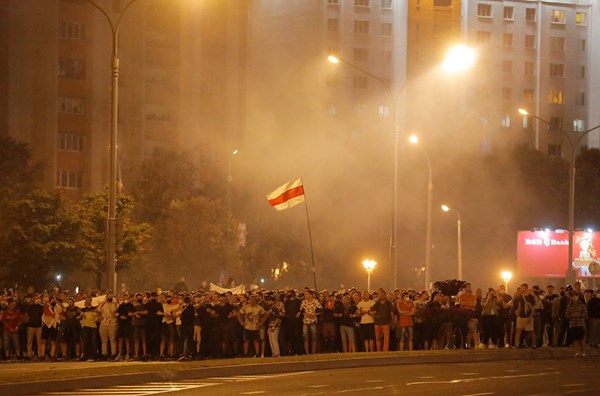Mass protests continue in Belarus
Mass protests are taking place in Minsk and other cities of Belarus, reported the Belarusian news outlet TYT.by and the Telegram channel Nexta Live.
Nexta Live announced the "March of Unity" across the country the day before. Its participants were supposed to gather on the central streets of their cities. On September 5, Alexander Lukashenko's rival in the last presidential elections, Svetlana Tikhanovskaya, also called for new protests.
Even before the start of the action, the Belarusian security forces blocked the central squares of the city, and the central subway stations were closed, TYT.by reports. In particular, the security forces cordoned off Independence Square and October Square, where protesters had gathered earlier. The central subway stations, which are located on Independence Avenue, were closed.
According to the TYT.by, the columns of the protesters headed to the center of Minsk from different districts of the city. In particular, one column moved to the center of the Mikhalkovo subway station and passed towards the central streets along Dzerzhinsky Avenue. Another column of activists came out from the opposite side - from Jacob Kolos street. Also, the protesters marched towards the center on Kalvaryyskaya Street.
Most of the protesters marched through the central streets of the city - on The Street of Nemige, Lenin Street, Independence Avenue and Winners Avenue. On Independence Avenue, protesters reached the cordon on Independence Square. TYT.by estimated those who marched to the Independence Square, as well as the number of people gathered on Lenin Street in tens of thousands.
The protesters then headed to the Palace of Independence, Alexander Lukashenko's working residence. The palace is next to Winners Avenue.
The press service of the Belarusian Interior Ministry said earlier that the streets in Minsk will be blocked ahead of the upcoming actions. As TYT.by writes, eyewitnesses saw military equipment in the Belarusian capital from the very morning. Some of the subway stations are closed and the central square of the city is cordoned off.
TYT.by writes that the "March of Unity" also began in Grodno. There were clashes with the riot police. The security forces detained several people. Protesters also took to the streets in Vitebsk, Brest, Mogilev and Bobruisk, Nexta Live reports. According to Telegram-channel, in Vitebsk, there were clashes between security forces and protesters, and several people were detained in Brest.
Protests in Belarus have been going on since August 9, they began after the presidential elections. The opposition accused the government of falsifications and demanded re-election. Their demands are supported by employees of large enterprises across the country.
Alexander Lukashenko repeatedly said that the protests, which are held in Belarus from the main day of voting on August 9, are financed from abroad. According to Lukashenko, the situation in the country is developing according to the scenario of "color revolutions." On August 16, speaking at a rally in his support, he said that Western countries are increasing their military power on the borders of Belarus, and NATO troops are "rattling sabers at the gates." In response, the head of the Lithuanian Foreign Ministry called Lukashenko's words a lie, and he himself called the former president of Belarus. NATO assured that the alliance does not pose a threat to Belarus.
Nevertheless, on August 22, Lukashenko reiterated the "serious movement of NATO troops" near the borders of Belarus, Poland and Lithuania. In this regard, he decided to put the armed forces on full alert and ordered to respond without warning to the actions of those who violate the country’s borders.
On August 23, when another mass rally of the opposition was held in Minsk (independent Belarusian media estimated the number of its participants at more than 100 thousand people, and the state channel "Belarus 1" - 20 thousand), Lithuanians lined up in a "chain of solidarity" with the citizens of Belarus. It stretched from Vilnius to the village of Medininkai, located near the border with Belarus, 50,000 people took part in the action.
